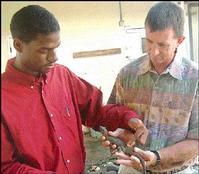
Orlando Robinson (left), curator of the Hope Zoo, and Michael Fouraker, executive director of Fort Worth Zoo, examinining two baby iguanas being raised at Hope Zoo, St. Andrew, on Wednesday.
-Damion Mitchell
Damion Mitchell, Staff Reporter
THE HOPE Zoo in St. Andrew has reported success in the breeding of the Jamaican
iguana.
The reptile was deemed extinct in 1948, but in 1990 Edwin Duffus took a 'strange creature' he found while hunting for wild pigs in Hellshire Hills, St. Catherine, to the Hope Zoo for identification.
The organism was identified as the Cyclura collie, commonly called the Jamaican Iguana, and since then personnel from Hope Zoo, with the support of the Fort Worth Zoo in the United States, has established a 'Head Start Project' with the aim of breeding the reptiles and returning them to their habitat.
THE REAL SUCCESS
In 2001, a set of young
reptiles was born in Hellshire, but the real success of the 14-year-old Head Start Project came in September this year when four Jamaican Iguanas were reproduced at Hope Zoo for the first time.
The initiative was made possible through a grant of $600,000 (US$10,000) from the International Iguana Foundation.
At a press briefing at Hope Zoo to announce the success of the programme, on Wednes-day, Errol Ennis, state minister for agriculture, said, "We think it is right to seek to the preservation of the iguana."
Michael Fouraker, executive director of Fort Worth Zoo, agreed. "Every species is like a rivet on a plane," he said, noting that each had a vital part to play in the ecosystem.
PUBLIC EDUCATION
Meanwhile, Orlando Robinson, Hope Zoo's curator, said there
has been a public education
programme in the Hellshire
community to alert persons of the importance of protecting the reptiles' habitat.
Mr. Robinson said under the Head Start Project, the young iguanas are removed from Hellshire to the zoo for about four years before they are tagged with electronic chips and same returned to their habitats, as at this stage they were no longer the main targets of predators.
Currently, there are about 40 iguanas at the zoo, including two mature ones.
But Mr. Robinson said
charcoal burning and other human activities near the two nesting iguana sites in Hellshire were discouraging. "Right now we are trying to make it a protected area."
As part of the breeding
programme, Jamaica has exported iguanas to some six centres operated by Fort Worth Zoo in the United States.










